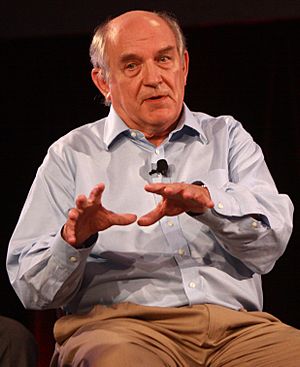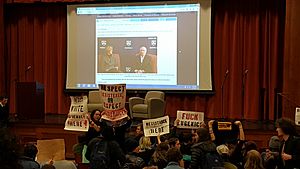Charles Murray (political scientist) facts for kids
Quick facts for kids
Charles Murray
|
|
|---|---|

Murray in 2013
|
|
| Born |
Charles Alan Murray
January 8, 1943 Newton, Iowa, U.S.
|
| Education | Harvard University (BA) Massachusetts Institute of Technology (MA, PhD) |
|
Notable work
|
Losing Ground (1984) The Bell Curve (1994) Coming Apart (2012) |
| Spouse(s) |
Suchart Dej-Udom
(m. 1966; div. 1980)Catherine Bly Cox
(m. 1983) |
| Children | 4 |
| Awards | Irving Kristol Award (2009) Kistler Prize (2011) |
| Scientific career | |
| Institutions | American Institutes for Research Manhattan Institute for Policy Research American Enterprise Institute |
| Thesis | Investment and Tithing in Thai Villages: A Behavioral Study of Rural Modernization (1974) |
| Doctoral advisor | Lucian Pye |
Charles Alan Murray (born January 8, 1943) is an American political scientist. He works as a scholar at the American Enterprise Institute. This is a conservative research group in Washington, D.C..
Mr. Murray's work has caused a lot of discussion. His book Losing Ground: American Social Policy, 1950–1980 (1984) looked at how America's welfare system worked. In The Bell Curve (1994), he and Richard Herrnstein wrote about how intelligence might predict life outcomes. These outcomes included things like how much money people earned or how well they did at jobs.
The Bell Curve also suggested that differences in average intelligence quotient (IQ) between groups might be partly genetic. However, this idea is now considered incorrect by most scientists.
Contents
Early Life and School
Charles Murray was born on January 8, 1943, in Newton, Iowa. His family was Republican and taught him about being responsible. His father, Alan B. Murray, was an executive at the Maytag Company. As a young person, Charles was known for being rebellious and playing pranks.
Murray said that the SAT test helped him get into Harvard University. He felt it allowed him to show his skills against students from bigger schools. Later, in 2012, he suggested that the SAT should not be used for college admissions anymore. He thought it had become a sign of privilege.
He earned a bachelor's degree in history from Harvard University in 1965. He then got a PhD in political science from the Massachusetts Institute of Technology (MIT) in 1974.
Time in the Peace Corps
In 1965, Murray joined the Peace Corps and went to Thailand. He stayed there for six years. While in Thailand, he married Suchart Dej-Udom, who was his language teacher. She was from a wealthy Thai family. Murray later said this marriage was a form of youthful rebellion.
His time in Thailand made him very interested in Asian culture. He felt that Chinese and Japanese civilizations showed amazing human achievements. He also said that his experiences in Thai villages shaped his ideas for his books. He noticed that government help often made things worse for villagers.
His work in the Peace Corps ended in 1968. After that, he worked on a program for the US military in Thailand. This program was with the American Institutes for Research (AIR) and the CIA. His doctoral paper at MIT argued against government interference in the lives of Thai villagers.
Family Life
Charles Murray divorced Suchart Dej-Udom after 14 years of marriage. Three years later, in 1983, he married Catherine Bly Cox. She was an English literature teacher. In 1989, they wrote a book together called Apollo: Race to the Moon. This book was about the Apollo program.
Murray and Cox live in Frederick County, Maryland. They have four children together, two from each of his marriages. Catherine Bly Cox became a member of a Quaker meeting. Murray has described himself as an agnostic who takes faith seriously.
Research Work
After returning to the US, Murray continued his research at the American Institutes for Research (AIR). From 1974 to 1981, he became the chief political scientist there. He looked at programs for education, welfare, and criminal justice.
From 1981 to 1990, he worked at the Manhattan Institute. There, he wrote Losing Ground. This book greatly influenced discussions about welfare reform in 1996. Since 1990, he has been a scholar at the American Enterprise Institute. In 2009, he received their highest honor, the Irving Kristol Award.
Losing Ground Book
In his book Losing Ground: American Social Policy, 1950–1980 (1984), Murray argued that social welfare programs can actually harm society. He believed they could hurt the very people they were meant to help. He suggested these programs should be stopped.
He proposed three "laws" about social programs:
- "Law of Imperfect Selection": Rules for who gets help will always leave some people out unfairly.
- "Law of Unintended Rewards": Getting help for a problem can sometimes make that problem seem more valuable.
- "Law of Net Harm": If a bad behavior is unlikely to change on its own, programs to change it might cause more harm than good.
The Bell Curve Book
The Bell Curve: Intelligence and Class Structure in American Life (1994) was a very popular but controversial book. Charles Murray wrote it with Richard Herrnstein. The book's name comes from the bell shape of IQ score graphs.
The main idea was that in 20th-century America, intelligence became a better way to predict many life outcomes. These included income, job success, and even crime. The book also said that very smart people were becoming separate from others. It warned this could lead to a dangerous society.
The most debated part of the book was about race and intelligence. It suggested that differences in average IQ scores between racial groups might be partly genetic. However, this idea is now widely rejected by mainstream science. Many scientists and scholars have written books and essays to disagree with The Bell Curve. They say its ideas about race and intelligence are not supported by evidence.
Coming Apart Book
In his book Coming Apart: The State of White America, 1960–2010 (2012), Murray looked at changes among white Americans. He described how poor white Americans and wealthy white Americans became more separated. He focused on white Americans to show that economic problems affected more than just minority groups.
He argued that white Americans were splitting into two groups. One was an upper class with good education. The other was a new lower class with less education. He suggested this new lower class was less hardworking and less likely to marry. Some critics said he chose his data to support his ideas.
Public Speaking and Protests
On March 2, 2017, Charles Murray was set to speak at Middlebury College in Middlebury. He was invited by a student club. Before he could speak, students protested loudly. They chanted and tried to stop him from talking.
The college moved his speech to another location. After the event, there was a difficult situation between protesters and Murray and some college staff. One professor was hurt. The college later took action against 74 students involved in the incident.
Political Ideas
Murray identifies as a libertarian. This means he believes in a lot of personal freedom and less government control. He has also been called a conservative.
Education Views
Murray has criticized the No Child Left Behind law. He felt it set goals that were not realistic. He argued that it asked too much from some students and not enough from others.
In his book Real Education: Four Simple Truths for Bringing America's Schools Back to Reality, he shared his ideas. He said that abilities are different for everyone. He also believed that too many people were going to college. He thought America's future depended on educating very smart students well.
In 2014, a speech he was supposed to give at Azusa Pacific University was postponed. This was because of his research on human group differences. Murray said it was unfair to dismiss his work just because it was controversial.
Economic Views
Murray believes the government has too many rules. He supports simpler tax laws. He also thinks that government benefits should be reduced.
In 2016, he suggested that a universal basic income (UBI) could replace welfare. A UBI would give everyone a regular payment from the government. He thought this could help with changes in the job market.
Views on Race
In The Bell Curve, Murray and Herrnstein discussed differences in race and intelligence. They wrote that the debate about genes and environment in these differences was not settled. They thought both genes and environment likely played a role. However, as mentioned, mainstream researchers do not agree that genetic differences explain racial disparities in intelligence.
The Southern Poverty Law Center has said that Murray's ideas are linked to eugenics. Eugenics is a discredited idea about improving the human race by controlling who has children. Murray has disagreed with this claim. Some other thinkers have defended Murray against accusations of racism.
See also
 In Spanish: Charles Murray (politólogo) para niños
In Spanish: Charles Murray (politólogo) para niños
- Historiometry
 | Misty Copeland |
 | Raven Wilkinson |
 | Debra Austin |
 | Aesha Ash |


